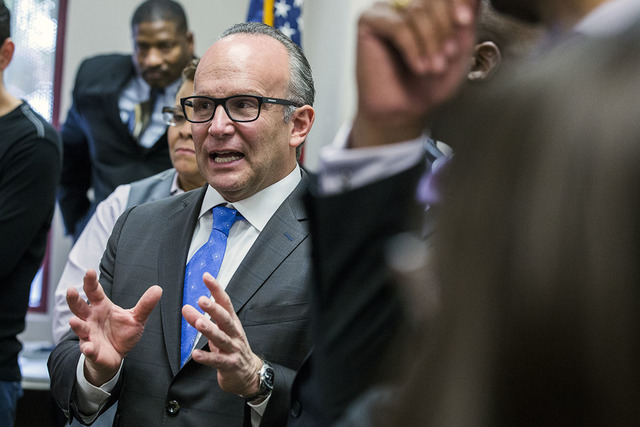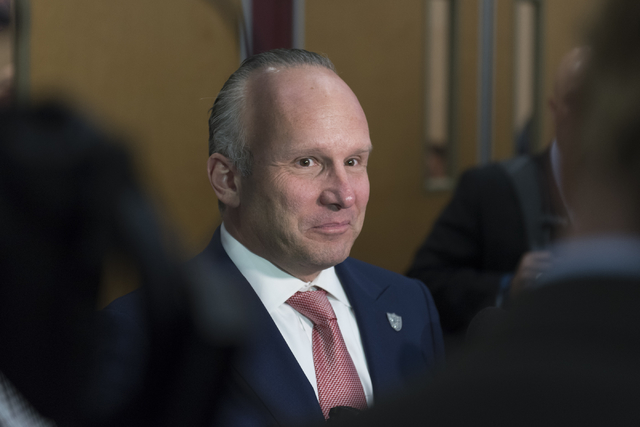Adelson spokesman on withdrawal from stadium project: Raiders were ‘picking his pocket’


From the start, it seemed like a partnership destined to bring the National Football League to Las Vegas.
The Oakland Raiders, one of the iconic franchises in professional sports. The family of casino executive Sheldon Adelson. The Southern Nevada Tourism Infrastructure Committee. Everyone involved with the plan described it as an alignment of the stars that seemed too good to be true.
The Raiders couldn’t secure a new stadium in Oakland. The Adelson family saw an opportunity to invite the NFL to Southern Nevada. A special committee appointed by the governor already was examining infrastructure projects to grow Las Vegas’ tourism economy as well as provide a new home for UNLV football. In 2016, everything was lined up to build a $1.9 billion, 65,000-seat domed stadium near the Strip.
Today, the Adelson family is out of the deal. The stadium’s financing plan suddenly has a $650 million hole and no announced partner to fill it. And the Raiders are six weeks away from a meeting where NFL owners could decide whether the team can move to Las Vegas.
What happened?
That’s a question that even representatives of the Adelson family are still asking.
‘STUNNING’
“It was stunning,” said Andy Abboud, vice president of government relations and community affairs for casino operator Las Vegas Sands Corp. and a spokesman for the family. “It’s still stunning.”
Abboud’s interview with the Review-Journal provided the first comments from either party about stadium development negotiations between the Raiders and the Adelson family. Talks began in October, when Nevada lawmakers and Gov. Brian Sandoval approved an increase in Clark County’s hotel room tax to fund $750 million of the stadium’s construction costs.
Abboud said Raiders executives changed their minds about issues in mid-negotiation, frustrating Adelson’s representatives as talks progressed.
He said the last straw was the Raiders’ decision to take a proposed stadium lease agreement to the Las Vegas Stadium Authority, the public body established to oversee the stadium’s development, without telling or involving the Adelsons. The family had pledged $650 million to the project, and the Raiders had committed $500 million.
Raiders President Marc Badain said by phone Friday that the team would not comment on the negotiations and that he stood by his comments at Thursday’s Las Vegas Stadium Authority board meeting.
At that meeting, Badain, UNLV President Len Jessup and Stadium Authority board chairman Steve Hill spoke glowingly of the Adelsons and said that without their involvement, Las Vegas would not be so close to a new stadium and having its own NFL team.
$650 MILLION WITHDRAWAL
Adelson, chairman and CEO of Las Vegas Sands, withdrew his $650 million commitment to the project on Jan. 30, four days after Badain and Executive Vice President Dan Ventrelle presented a 117-page draft lease agreement to the authority.
“The concern that we had and the concern that everybody has in hindsight is the 117-page proposed lease agreement that did not reflect the commitments that the Adelson family made to the Raiders and that the Raiders had made to the Adelson family,” Abboud said. “It did not reflect the commitments that were made to UNLV. It did not make the commitments that were promised to the community, and it was in no way reflective of the months of (Southern Nevada Tourism Infrastructure Committee) meetings and reflective of what it took to get the members of the Legislature to vote for the funding.”
Abboud said Robert Goldstein, president and chief operating officer of Las Vegas Sands, and Patrick Dumont, executive vice president and chief financial officer for Sands, negotiated with the Raiders on behalf of the Adelsons. Dumont is also Adelson’s son-in-law. (The Adelsons’ contribution to the stadium would have come from their personal wealth, not as an investment by Sands.)
After months of appearing together at public meetings and at a rally at UNLV’s Thomas & Mack Center, it appeared the Raiders and the family were on track to formalize their partnership as stadium developers, negotiate a lease agreement with the Las Vegas Stadium Authority and build the dome. The authority also would negotiate with an events company that would schedule sports and entertainment events beyond Raiders and Rebels football games.
Abboud said the Raiders’ tone changed when Sandoval signed the legislation.
The two sides reviewed all aspects of their partnership: stadium naming rights, sponsorships, revenue from stadium contractors, parking, signage and use by UNLV.
“All those things were negotiable, and then even when we got to the point that we thought we had a deal, they’d change their minds again,” Abboud said. “And we negotiate deals every day all over the world. The Adelson family has made a lot of people rich in the world. This is a family that negotiates with everyone from Barney’s to Emeril Lagasse and deals with the governments of Singapore and China. They know when to be reasonable and how to cut a deal.”
‘PICKING HIS POCKET’
As negotiations continued through the fall, sometimes in person and sometimes by phone, the Raiders were seeking more and more, Abboud said.
“(Adelson) was willing to share revenues and make it financially mutually beneficial, but they were picking his pocket,” Abboud said. “I think that they felt they were asking to be entitled to revenue streams and things that simply made the deal unworkable. It was never about the financial return for the Adelsons, but the Adelson family wasn’t going to have their pocket picked, by the Raiders or by the NFL or anybody.”
Throughout the talks, the family’s negotiators said they received mixed signals about the NFL’s perception of the city of Las Vegas and the Adelson family’s involvement in the deal.
“We just kept hearing conflicting stories about how we could do it and how the NFL owners felt about it,” Abboud said. “We felt it was conceivable that they were using that as a tool for manipulation. I don’t know.”
Then came the Jan. 26 stadium authority board meeting. Abboud transported Badain and Ventrelle to the Southern Nevada Water District meeting room. The Raiders executives presented the proposed lease, which had no mention of Adelson as a partner, to the authority staff, who made copies to distribute to board members.
LEASE PROPOSAL BOMBSHELL
“I’m still trying to figure out what the hell they were thinking,” Abboud said. “Had they told anybody ahead of time that they were going to dump that document, even if they had told us, ‘We don’t want you in the deal anymore,’ if they had shown anyone that’s been involved in this process at all that document, we would have said, ‘What in the hell are you thinking?’”
Adelson reacted swiftly after hearing the news, opting to withdraw his $650 million contribution.
“He wanted everyone in the state to know and the community to know that he would never have asked for that $750 million if we knew the Raiders were going to come forward with terms that were not reflective of anything we had discussed over the last year,” Abboud said. “He would have never asked for that kind of commitment from the state based on the lease agreement the Raiders proposed.”
The lease called for the Raiders to pay $1 per year in rent, gave the Raiders full control of the UNLV football schedule and denied the Rebels the ability to have their brand on field markings.
Abboud believes the Raiders miscalculated the importance of UNLV’s use of the stadium to legislators.
“Of course UNLV should have their markings on the field,” Abboud said. “The insistence (in the lease) that UNLV could not have their brand in the stadium that was funded by the state is evidence of how frustrated we became.”
Senate Minority Leader Michael Roberson, R-Henderson, was majority leader when the stadium legislation passed in October. He affirmed that UNLV’s use of the stadium was paramount to legislators.
“The UNLV aspect was very important to all of us in terms of this whole process of building a stadium,” Roberson said by phone Friday.
Asked whether he thought the legislation would have failed without accommodations for UNLV, he said, “I don’t know, but remember, it only passed by one vote in the Assembly, and I know the UNLV aspect was important.”
At Thursday’s stadium authority meeting, Badain apologized for the perception that the Raiders would be inflexible on field and stadium markings. Jessup said he is satisfied that on Rebel game days the stadium will look like a UNLV home field.
BIG MISCALCULATION
Abboud also said he thinks the Raiders and the NFL misjudged the Las Vegas community.
“Don’t underestimate the ability of Las Vegas to stand up for itself,” he said. “The Las Vegas Raiders are today’s bright, shiny object. There will be a new bright, shiny object tomorrow and there will be another bright, shiny object after that. This is a city that always has one fabulous new idea after another. You had to be deaf and blind to think the city or the state were ever going to roll over for anybody.”
He said the Adelson family remains committed to getting a stadium built and having an NFL franchise in Las Vegas. Abboud said that if the Raiders have an investor to help as a stadium developer, the family would be happy, but they aren’t aware of any prospective partners. Abboud also thinks there are tough negotiations ahead if the Raiders proceed.
“If they think that they’re going to go forward making it all about the Raiders and not about all the other things that drive visitation, I think they should be prepared for some long stadium authority meetings,” he said.
The Review-Journal is owned by the family of Las Vegas Sands Corp. Chairman and CEO Sheldon Adelson.
Contact Richard N. Velotta at rvelotta@reviewjournal.com or 702-477-3893. Follow @RickVelotta on Twitter.
RELATED
Atlanta Falcons owner: Raiders relocation process still on track
Roger Goodell: NFL against casino interests owning franchises
Las Vegas Stadium Authority will continue to work with Raiders
Goldman Sachs financing in jeopardy after Adelson exit from Raiders stadium plan
Raiders: Las Vegas stadium financing secure, with or without Adelson investment
Oakland Raiders file for relocation to Las Vegas
Ford says he’d back new infrastructure spending if Raiders don’t move to Las Vegas












